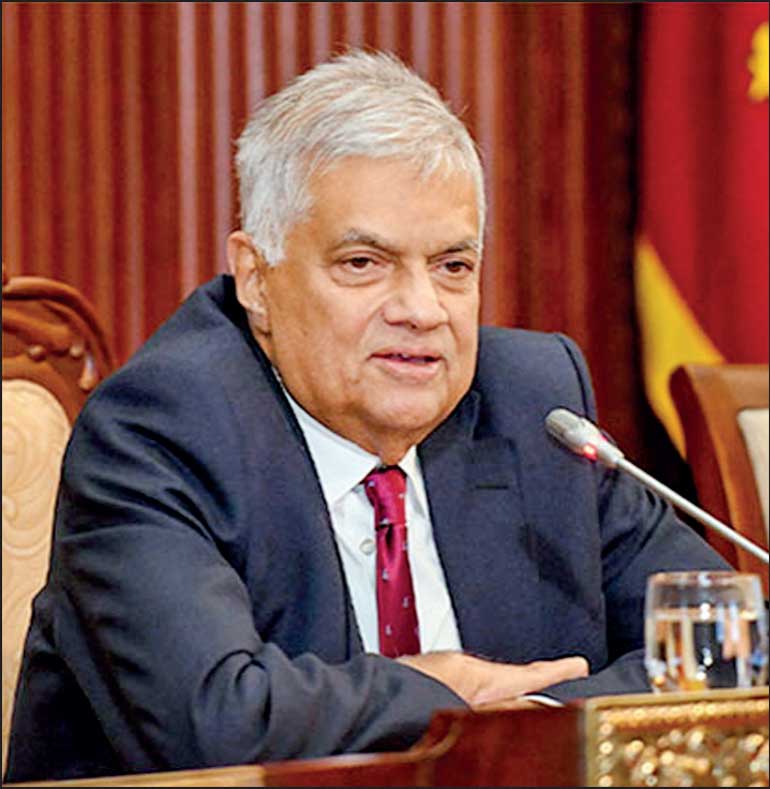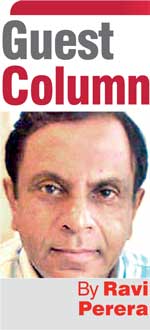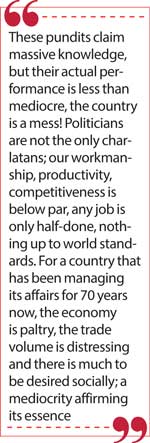Sunday Feb 15, 2026
Sunday Feb 15, 2026
Friday, 7 November 2025 00:28 - - {{hitsCtrl.values.hits}}

Why listen to a man on policy challenges, when he had the power to change them while in power?
 “He reached the utmost limit in knowledge”
“He reached the utmost limit in knowledge”
– Medieval Arabic saying
Sri Lanka’s trade volume is virtually invisible when compared with the global scale or even the giants of Asia.
In 2023, our total trade value was roughly $ 32 billion, of which exports were around $ 13.6 billion while imports were $ 17.6 billion, leaving the country with a deficit of about $ 4 billion.
Our main exports were tea, rubber, apparels and spices. The commercial plantations introduced during the colonial era remain vital for the economy, while the apparel industry which came in the late 1970s has become a mainstay of our industrial output. Known as a poor man’s industry, apparels require a large labour pool, utilises basic technology, there are many competitors, and the margins are limited.
By way of comparison, our neighbour India has a trade volume of about 1.73 trillion (exports $ 820, imports $ 915 billion). It is distinctly embarrassing when we compare ourselves with tiny Singapore which has a trade volume of $ 1.23 trillion (exports $ 638 and imports $ 567 billion).
To round up, let us glance at much ravaged Cambodia, a country of 17 million people. It has a trade volume of $ 54 billion, exports 26 billion and imports 28 billion.
Our failure is gigantic indeed!
In this dismal backdrop, my interest was piqued by a recent YouTube of a discussion with the title “policy challenges of globalisation in Sri Lanka”. The title was from a book launched at that event by an economist by the name of Dr. Sarath Rajapathirana. The guest of honour at the event was former president Ranil Wickremesinghe. Clearly, both men are of advanced age; where other cultures consider senility, in our country this is the age of great wisdom.
Infinitely small our share of global trade maybe, we yet can talk about it. We may not manufacture a push-bicycle that could gain a market in the outside world, but we can hold a seminar on space exploration. Going by what has been happening in our so-called intellectual circles, seminars on extra-terrestrial matters at posh hotels in Colombo should not surprise us. Our learned speakers will expand on the space race, quote the various agreements governing these things (using acronyms to show familiarity) and of course end up with vague references to our ancestors escaping gravity to explore the universe!
But we cannot make that marketable bicycle!
There is a huge audience for nonsense.
The country is a mess
 At every street corner in this sorry country, we meet know-all’s; concrete results are not important, a mere show of punditry will satisfy the audience! These pundits claim massive knowledge, but their actual performance is less than mediocre, the country is a mess! Politicians are not the only charlatans; our workmanship, productivity, competitiveness is below par, any job is only half-done, nothing up to world standards. For a country that has been managing its affairs for 70 years now, the economy is paltry, the trade volume is distressing and there is much to be desired socially; a mediocrity affirming its essence.
At every street corner in this sorry country, we meet know-all’s; concrete results are not important, a mere show of punditry will satisfy the audience! These pundits claim massive knowledge, but their actual performance is less than mediocre, the country is a mess! Politicians are not the only charlatans; our workmanship, productivity, competitiveness is below par, any job is only half-done, nothing up to world standards. For a country that has been managing its affairs for 70 years now, the economy is paltry, the trade volume is distressing and there is much to be desired socially; a mediocrity affirming its essence.
We are a nation in the grip of mid-summer madness. What Shashi Tharoor observed of India, “everybody is rushing about, but no one is on time”, fits us to a tee. In our common narration, Sri Lanka is blessed with superlative leaders, but our average annual economic growth rate has been a paltry 4% since independence! We learn every day that corruption has been the lubricant of nearly every design and project in this country. Corruption in various forms: bribes, kickbacks, gifts and patronage have made yesterday’s ‘nobodies’ into today’s ‘somebodies! To a culture with doubtful moorings, the only criteria is money, and money has made these new ‘somebodies’ look gigantic, giants in a Lilliputian land!
“Policy challenges of globalisation in Sri Lanka” suggests that we have a policy in globalisation, now facing headwinds. Clearly the main draw at the book launch was the former President Ranil Wickremesinghe who can claim nearly 50 years in public life, a good many of these deciding national policies. For reasons not difficult to discern, Wickremesinghe has had a charmed political career since 1977; when a junior MP he was made a minister of the government led by his uncle JR Jayawardena. He went on to hold many ministerial positions, Prime Minister several times and eventually was appointed President in 2022.
Our post-independence history displays an obvious poverty in the national leadership, no great nation builders, no true visionaries, a country performance emphatically mediocre. Any economic statistic will show the emptiness of the show. However, taken as individuals, we have had several politicians who were well-read, cosmopolitan and perhaps honest when handling public funds. In the early decades after independence many politicians were educated in English, thus open to the larger world. As was habitual then, they were avid readers and had eclectic interests.
Dudley Senanayake, J.R. Jayewardene, S.W.R.D. Bandaranaike, N.M. Perera, Colvin R. De Silva, Pieter Keuneman, Bernard Soysa, Ronnie De Mel and later even Lalith Athulathmudali, Gamini Dissanayake were intellectuals in a broad sense. By their side Wickremesinghe would have been unremarkable. As these leaders gradually moved out of the stage, there was a noticeable narrowing of our intellectual landscape. Now, the ordinary looks extraordinary, in the land of the blind, the one-eyed man can be king.
A strong elected executive
When introducing his Constitution (1978) J.R. Jayewardene argued that to achieve rapid development the country needed a strong elected executive who will be free of the pressures of parliamentary politics. Since the elected executive will come with a mandate of the people, he will command legitimacy. What happened in 2022 was the very opposite of such a mandate. Wickremesinghe, who had lost his seat at the parliamentary elections before that, had come to parliament based on the single bonus seat his party had earned. And, when in 2022 the sitting President Gotabaya Rajapaksa fled the country, the parliament in which the run-away president’s brother Mahinda Rajapaksa’s People’s Alliance held a majority, elected Wickremesinghe, supposedly from the Opposition party, President.
In the turbulence of those troubled days, although constitutional formalities of succession were followed, the spirit of democracy, the mandate to rule became secondary; there was no talk of a government by the people, for the people.
The ‘Aragalaya’ which forced Gotabaya Rajapaksa to flee the country had run its course. Forced to default on its debt Sri Lanka had to swallow the IMF prescription; get credit from the IMF, increase taxes on its citizens and devalue the currency. Perhaps made delirious by the tragicomedy unfolding in the tropical heat, this was hailed by some as a huge achievement.
After a couple of years as President, Wickremesinghe went for a Presidential election. He had a choice of holding the Parliamentary election first. Often in our leaders, hubris distorts their perception. He probably fancied his chances at a Presidential election. In the Presidential contest Wickremesinghe was a distant third; no presidential mandate to start with, no endorsement at the end of the presidency! To imagine that Wickremesinghe would have another bite at policy making seems like a mid-summer night’s dream. But then, anything is possible in a Lilliputian land when in the grip of mid-summer madness!
Why listen to a man on policy challenges, when he had the power to change them while in power? To claim mastery in all kinds of economic theories is pure conjecture, when previously Wickremesinghe was in office, there was no noticeable resurgence in the economy. After his 50 years of politics, Sri Lanka remains a tiny economy, and in comparison, to Asian tiger economies, backward. To the overrated Colombo windbags, there is no other man and there is no other way. While they look for leadership from a preordained family or fakes from our doubtful elite, the world caravan has moved on.
In the discussion that followed the launch of the book Wickremesinghe was at pains to establish his erudition, as he is wont to do. Commenting peremptorily on wide-ranging topics such as the Ganges River Civilisation, the Washington Consensus (a contentious title), American trade policy today, Western security concerns and the evolution of various economic groupings among fast growing economies of Asia (invariably using the abbreviated title).
Multi-faceted subjects open to varied interpretations
Such cavalier opinions were not meant to enlighten the listener, clearly, they were apocryphal in substance. A mere opinion by a person does not mean he understands all the ramifications of the matter himself. Even if the listeners were unaware of the specific issues, they would be intelligent enough to know that these are complex and multi-faceted subjects open to varied interpretations. His words however were not meant for that small gathering, he was addressing another audience, an audience who in Wickremesinghe’s mind constitute the majority in the country; an audience which thrills almost mechanically to digs at the West and bows reverentially to any reference to Buddhism.
Expanding on the Ganges River Civilisation, Wickremesinghe said that even in those faraway days there was globalisation (trade, ideas) but as Hindus they could not cross the seas until Buddha encouraged them to do so. There was no reference to his source. The missions which took Buddha’s message to various Asian realms happened a couple of centuries later. Among other things, his message was one of peace, wisdom, impermanence and of course the renunciation of selfish cravings, but not of seafaring.
Wickremesinghe then suggested a reason for Sri Lanka’s failure, we took advice from economists from the United Kingdom, a country in decline. Singling out those from the Sussex School of Development, he described some of these advisers from Sussex as funny creatures to the hardly suppressed giggles of the audience. The East Asians on the other hand, took advice from Harvard graduates.
A leader of a bankrupt country with an economy less than $ 100 billion, was passing judgment on a country with an economy of over $ 4 trillion. For thousands of Wickremesinghe’s countrymen, entry to the United Kingdom, a country in decline in his assessment, is their only path to a better life. While publicly bashing the United Kingdom, our elite do not hide their esteem for things British, especially British educational qualifications, even an honorary degree from Britain will be grabbed with both hands. They also eagerly attend the funerals, weddings and coronations of the British King, who after all is only a symbol of that nation, a figurehead.
To our leaders, British advisers may seem funny, how would our leaders look to the outsider?
Aging men, alternately hogging leadership positions for fifty years in a country which has gone to the IMF several times, an abject receiver of foreign aid, a passport universally disregarded; a country inefficient, nepotistic and corrupt!
Towards the end of the discussion Wickremesinghe challenged a young participant “where do you live, do you have running water, electricity, a proper roof over your house? Before 1977 many in my electorate did not have these amenities…”
All these came to the young man only because of the enlightened leadership of the then Government of which he was a minister. Good things happen because the politician makes them happen. He is the beginning, and the end.
Are our leaders funny, or are they hilarious?
The proceedings at the book launch ended with author Sarath Rajapathirana speaking a few words. He wanted to thank with some ceremony three individuals who had assisted him in getting the book together, but he could not quite remember their names…